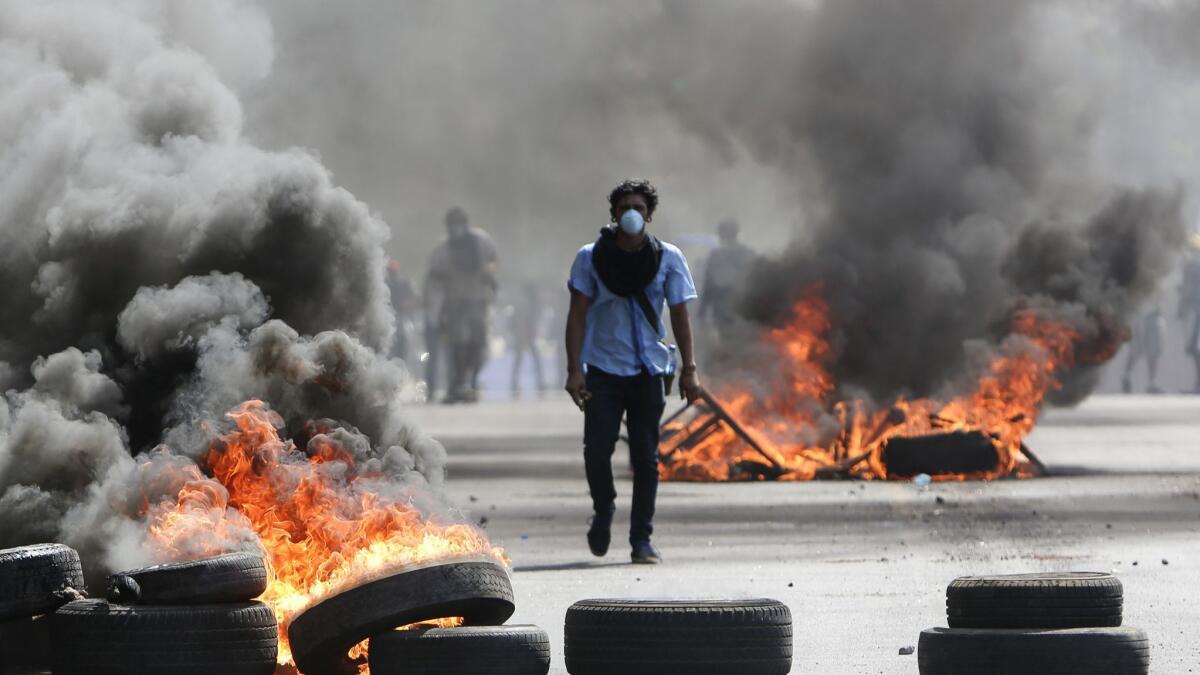Op-Ed: Nicaragua’s democracy is falling apart

- Share via
For years, Nicaraguans seemed to tolerate the growing authoritarianism of President Daniel Ortega in exchange for stability and growth. That pact is now crumbling.
Massive protests and riots have rocked the foundations of the Sandinista government over the past week. The demonstrations were triggered by changes to the country’s social security system, but protesters have since demanded that Ortega resign and that Nicaragua’s democratic institutions be restored.
Dozens of protesters have been killed, according to human rights organizations. The United States has shut down routine operations at its embassy in Managua and pulled diplomats’ families from the country. On Saturday, a Nicaraguan journalist was shot dead in the coastal city of Bluefields while broadcasting on Facebook Live.
This is a critical moment for Nicaragua, one in which the U.S. could play a vital role. Instead of isolating the Ortega regime, the U.S. and other countries in the region should pressure the government to undertake immediate democratic reforms. Without a clear path forward, this Nicaraguan Spring may meet the same fate of protest movements past: lasting instability, violence and even more repression.
Ortega himself came to power through a democratic uprising. After the Nicaraguan Revolution, he led the country from 1979 to 1990 as head of the Sandinista Front. He returned to the presidency in 2007, through elections and informal alliances with elites and big business, promising stability in exchange for support.
Ortega delivered significant economic growth. Under his rule, Nicaragua has avoided the drug and gang-fueled violence that has plagued many of its neighbors. But he also gradually dismantled all checks and balances, packed the judiciary with his acolytes, restricted free press and repressed almost all political opposition.
The demonstrators are calling for resignations and a clean slate, but a Nicaragua without Ortega would not automatically be more democratic.
The last shred of Nicaragua’s democracy dissolved with Ortega’s reelection in 2016. Having abolished term limits, he won a third consecutive term with his wife, First Lady Rosario Murillo, as his running mate. The couple got an improbable 72% of the vote, in part by banning the main opposition party, defunding and splintering the opposition and barring international election observers.
The government has since made a series of missteps. Ortega reportedly has health problems, limiting his involvement and leading him to cede most decisions to Vice President Murillo, a deeply polarizing figure. Meanwhile, a previous supply of aid and cheap oil from Venezuela was cut off after that country’s economic collapse, jeopardizing some of the social programs with which the Ortega government had placated Nicaragua’s poor.
It was against this backdrop that, on April 16, the government announced a reform of the national pension system that would increase worker and company contributions while reducing benefits.
Pension reform tends to be a third rail in Latin American politics, and Nicaraguans across the political spectrum were outraged. A tremendous miscalculation by a government that is usually seen as politically astute, the move also served as a further indication that Ortega might not be in control.
The Ortega regime has responded to Nicaragua’s explosive riots with deadly force. More than 200 people have reportedly been jailed, and protesters have accused police of torturing those in custody. (According to the government, most of them have been released.) Hundreds have been injured, and more than 30 people have died. The crackdown has not quelled the protests, nor has the government’s move on Sunday night to scrap the new pension law.
The demonstrators are calling for resignations and a clean slate, but a Nicaragua without Ortega would not automatically be more democratic. Ortega’s followers control all of Nicaragua’s institutions, including three-quarters of the seats in congress and most of the judicial branch. What’s left of the political opposition is weak, divided and underfunded, and there is no clear alternative leader within the regime or outside of it.
The U.S. Congress is currently considering legislation that would freeze loans from international financial institutions to the government of Nicaragua until it undertakes democratic reforms. Although the 2017 bill, the Nicaraguan Investment Conditionality Act, may be well-meaning, American lawmakers should tread carefully. Unilateral punishment by Washington will weaken the Nicaraguan economy, potentially harm the Nicaraguan people and alienate other countries in the region. It also may give Ortega an excuse to crack down further.
The Nicaraguan government plans to convene a set of mediated talks with protesters, the business sector and the Catholic Church in the coming weeks. These negotiations represent a window of opportunity to translate Nicaragua’s mass demonstrations into democratic reforms. The U.S. should support this process and send diplomats to the talks, as should other countries that belong to the Organization of American States.
Once there, the U.S. ought to pressure the Ortega government to restore presidential term limits, remove controls on the media and civil society, change electoral laws to even the playing field for the opposition, implement anti-corruption measures, reform the heavily politicized judiciary and even schedule new elections. The U.S. should work with other Latin American countries, including Mexico and Costa Rica, to apply this pressure.
It is easier to topple an autocracy than it is to build a democracy, of course. Nicaraguans know this well. Less than four decades ago, a mass uprising helped topple the brutal Somoza dictatorship — a movement led, in part, by a young revolutionary named Daniel Ortega.
Ben Raderstorf is an associate at the Inter-American Dialogue in Washington, D.C. Bruno Binetti is a fellow at the Inter-American Dialogue in Buenos Aires, Argentina.
Follow the Opinion section on Twitter @latimesopinion or Facebook
More to Read
A cure for the common opinion
Get thought-provoking perspectives with our weekly newsletter.
You may occasionally receive promotional content from the Los Angeles Times.









